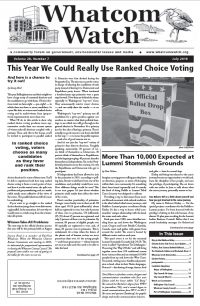1. Background: For almost a half a century (1972 to present), Western Washington University (WWU) has not built a dormitory on campus, while increasing enrollment by 50 percent (5,000+ students) over the same period. WWU continues to house only about 4,000 students on campus leaving 10,000+ to compete for rental lodging with local residents, including workers and families. Bellingham is now experiencing a severe rental housing shortage. The university plans to add another 2,000 students in the next 5-10 years while adding a marginal 260 dormitory beds on campus by 2021.
Should the university be brought to the table as a major cause of the shortage of rentals in the city? What demands are you willing to make of the university to assist in mitigating Bellingham’s severe rental shortage?
Reframing the question into a statement: WWU is a public university that has a mightily influential presence in the city’s positive growth, accounting for tens of thousands of brilliant minds enriching our area. Whatcom Community College, Northwest Indian College, and Bellingham Technical College also add to our numbers. They absolutely should have a place at the table for planning and providing an array of housing programs and properties to all students in need of them.
2. Background: For businesses to be effective in our information-intensive economy, they need bandwidth delivered on a fiber-optic infrastructure, which provides speed and reliability. Bellingham city government has not yet made the commitment to pursue an effective fiber-optic infrastructure that is offered as an open-access network, giving co-ops, as well as telecoms, access. Doing so would attract new businesses and would provide a wider variety of internet options for existing businesses and residents. We have our neighbor, Mt. Vernon, as a model for success in doing this.
Do you feel that identifying the city’s current network, and adding to it as necessary to create a reliable fiber infrastructure is a priority?
Yes. As we become increasingly advanced in all of our technologies, I think the fiber-optic infrastructure will be crucial to the city’s goals of evolving to become 100 percent consumers of renewable energy sooner rather than later. It will also play a role in socioeconomic equity, allowing access to opportunities for improving quality of life that internet connection delivers when used for the better.
3. Background: The current Bellingham Comprehensive Plan envisions that future population growth will find housing in high-density urban villages. How best to provide additional housing in the city is an ongoing discussion. For example, new city code now permits backyard dwelling units.
Do you favor permitting multifamily housing, like triplexes, in areas of the city now zoned exclusively for single-family, detached homes?
Yes. Currently there is Bellingham Municipal Code 20.08.020., under the heading of “family”, that states a lawful situation for a residence zoned as single-family as “one or more persons related by blood, marriage, or adoption, or not more than three unrelated persons, living together within a single dwelling unit.” Many vulnerable renters are breaking this code out of necessity for survival.
4. Background: Nearly a half mile of Whatcom Creek and its estuary are about to have large-scale development projects started, none of which appear to put any emphasis on habitat, climate adaptation (sea level rise), or stormwater runoff. Each of these projects is completely under control of, or the property is owned by, the port, city, or school district. The permits for the State and Ellis bridges were rushed specifically to avoid impending state updates to shoreline and riparian rules.
What tactics and plans do you have to aggressively restore habitat and enforce the buffers and best management practices suggested by science, new state legislation, and by the city’s own Critical Areas Ordinance?
I would like to also consult our local conservation corps crews about aggressively restoring habitat. I do not have a more comprehensive planned response to give at this time.
5. Background: “Transportation is the largest source of greenhouse gas emissions in Bellingham, making up 32 percent of all community emissions.” (From the Bellingham Climate Action Plan.)
In recent years, Bellingham has made progress towards an active transportation network that helps reduce our carbon footprint as well as families’ transportation costs. More people are able to get where they need to go by walking, pedaling, and rolling (such as wheelchairs).
However, the connections for safe and active transportation are a long way from being complete, due to U.S. transportation planning that has for decades prioritized the movement of motor vehicles.
What transportation planning and funding solutions will you champion to accelerate both Bellingham’s reduction of carbon emissions and progress toward a safe and connected active transportation system for all ages and abilities?
I admire the current plan the WTA has to have an all-electric fleet within the next few years. The city should support this endeavor as much as possible. All solar or wind power structures and facilities built to sustain the fleet could also be used as power storage for other city use. In terms of specific vehicle design, I would like to see built-in child safety seat features, see an overhead text script, and hear an automated voice announcing each stop.
6. Background: The Bellingham Municipal Code 13.16 outlines city regulations for 5G small cell installations. These were drafted in response to a 2018 City Council vote to support 5G installs. On January 14, 2019, new FCC regulations went into effect denying local municipalities the right to refuse 5G installations. So, Bellingham is set to proceed, yet there is an increasing outcry nationally and globally about the lack of scientific testing for safety, environmental effects, security and privacy issues. There is strong scientific basis for all these concerns. Some cities and states are suing against the FCC overreach. The Portland mayor refuses to proceed on the basis of health safety concerns, as well as FCC overreach.
What is your stance on supporting 5G installation in Bellingham?
I will not support 5G cell installation until it is properly tested for its effects on living organisms and proves harmless to all pollinators, and also has ample protective legal measures in place so that our lives are not minutely under surveillance in real-time. “Cookies” data collection is intrusive enough as it is.





























